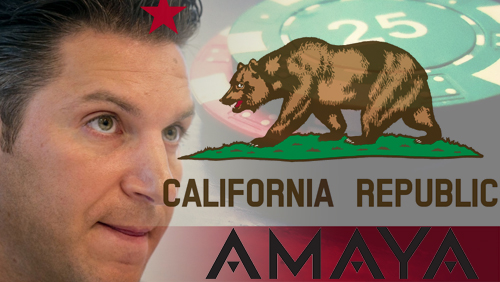 California may have given up already on passing its online poker legislation this year, but Amaya Gaming is not raising the white flag yet.
California may have given up already on passing its online poker legislation this year, but Amaya Gaming is not raising the white flag yet.
Eric Hollreiser, vice president of corporate communications for Amaya, told Financial Post that there’s a “a lot of momentum” during the legislative session, so they are confident that it’s only a matter of time before their efforts pay off.
“Obviously, we’re hoping that it’s sooner rather than later,” Hollreiser said, according to the report.
The Canada-based online gaming company is actively lobbying to enter the U.S. gambling market even though only three states—Nevada, New Jersey, and Delaware—have legalized online gambling to this day.
Still, Amaya CEO David Baazov insists that by actively lobbying, they are letting their clientele and the government know “that they’re protected by a legitimate, forward-looking industry.”
The media outlet quoted the Amaya chief saying, “Regulation ensures license holders have the correct auditing, fraud and fund protection in place to protect consumers and allow strict government oversight.”
However, it will be a long time before any online poker bill sees the light in California. It will be a long shot that a bill will be introduced, let alone passed, in 2016 as it will be an election year.
The 2015 California legislative session ended on Sept. 11 with no consensus reached on the pending online poker legislation. The cause—stakeholders were never on the same page, with some tribes squabbling over Amaya Gaming’s PokerStars participation, while other tribes put their feet down against state racetracks that are also looking to get a piece of the online gambling pie.
There was some progress made in 2015, after Assemblyman Adam Gray’s AB 431 made history by getting the approval of the Governmental Organization Committee. The “shell” bill, which only serves as a vehicle to keep the online poker conversation going in the legislature.
Pennsylvania remains the last hope for a legislative progress this year. Like California, Pennsylvania also saw several online gambling bills introduced in 2015, but partisan battles between the Democratic governor and the GOP-led legislature have caused the delay in passage of a new state budget, and most observers are skeptical that online gambling revenue will play a role in whatever compromise the two parties come up with.
Amaya also has its eyes set on bringing PokerStars, which it acquired last year for $4.9 billion, to New Jersey. Baazov said the company expects to receive its license from the Division of Gaming Enforcement sometime in the third quarter of 2015.




